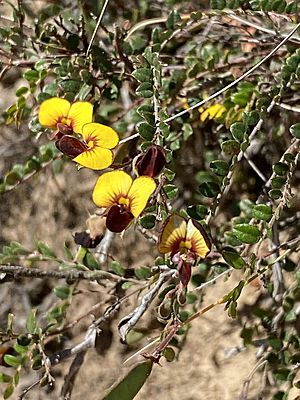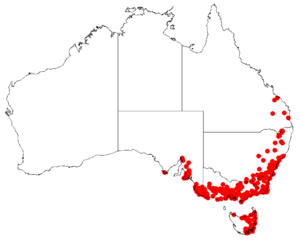Creeping bossiaea facts for kids
Quick facts for kids Creeping bossiaea |
|
|---|---|
 |
|
| Bossiaea prostrata near Taralga | |
| Scientific classification |
|
| Kingdom: | Plantae |
| Clade: | Tracheophytes |
| Clade: | Angiosperms |
| Clade: | Eudicots |
| Clade: | Rosids |
| Order: | Fabales |
| Family: | Fabaceae |
| Genus: | Bossiaea |
| Species: |
B. prostrata
|
| Binomial name | |
| Bossiaea prostrata |
|
 |
|
| Occurrence data from AVH | |
| Script error: The function "autoWithCaption" does not exist. | |
Script error: No such module "Check for conflicting parameters".
Creeping bossiaea (also known as Bossiaea prostrata) is a small, low-growing shrub. It belongs to the pea family, called Fabaceae. This plant is found in many places and has pretty orange-yellow flowers. Its branches spread out along the ground.
Contents
What Does Creeping Bossiaea Look Like?
Creeping bossiaea is a shrub that grows low to the ground. It can spread out up to 0.2 meters (about 8 inches) wide.
Leaves and Stems
The leaves of this plant are dark green on top and lighter underneath. They are shaped like an oval or a circle. Each leaf is about 3 to 15 millimeters long and 2 to 10 millimeters wide. They have a small stalk, called a petiole, about 5 millimeters long. The leaves grow one after another along the stem. They can be smooth or have a few hairs. The stems are a bit flat near the tips.
Flowers and Seed Pods
The flowers are usually found alone or in pairs. They are about 6 to 12 millimeters long. The main petals are bright orange-yellow. The back of these petals can be a bit pinkish-brown. The bottom petals, called keels, are purple-brown. The flowers grow on stalks about 1 to 2 centimeters long. After the flowers, the plant produces seed pods. These pods are long and thin, about 1.5 to 3.2 centimeters long. Creeping bossiaea usually flowers between September and November.
How to Tell it Apart
This plant looks a bit like another species called Bossiaea buxifolia. But you can tell them apart because creeping bossiaea has longer leaves and flower stalks. Its leaves are also spaced further apart.
How it Got its Name
The scientific name for creeping bossiaea is Bossiaea prostrata. A botanist named Robert Brown first described this plant in 1812. He published his description in a book called Hortus Kewensis. The word prostrata comes from Latin. It means "down flat" or "laid low," which perfectly describes how this plant grows close to the ground.
Where Does Creeping Bossiaea Grow?
Creeping bossiaea is found in many parts of Australia. You can see it in South Australia, Victoria, Tasmania, New South Wales, and Queensland. It likes to grow in different places like coastal heathlands, grasslands, and open forests. It can grow in various types of soil, including clay. This plant prefers areas that are a bit wetter.
 | Delilah Pierce |
 | Gordon Parks |
 | Augusta Savage |
 | Charles Ethan Porter |

